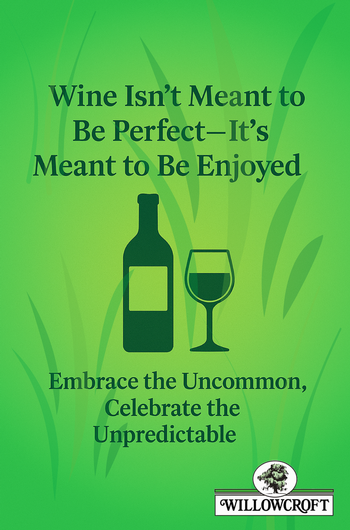Perfectly Imperfect: How to Embrace Faults and Find Your Favorite Wine
 In the world of wine, perfection is elusive, which is precisely what makes it so captivating.
In the world of wine, perfection is elusive, which is precisely what makes it so captivating.
Much like people, every bottle of wine carries its own story, quirks, and character. Sometimes that story is rich and complex; other times, it’s a little offbeat. You may have heard terms like corked, oxidized, or reductive thrown around in tasting rooms or wine forums—but what do these so-called “faults” really mean, and should they scare you off?
Let’s uncork the truth.
A wine fault is typically defined as a chemical or microbial issue that deviates from what’s considered a “sound” wine. These can result from problems during winemaking, bottling, storage, or even cork taint. But here’s the catch: not all deviations are dealbreakers. In fact, some are simply nuances, and whether or not they bother you depends entirely on your palate.
Just like some people love blue cheese while others can’t stand it, wine “flaws” are often subjective. That little funky note or oxidative edge? It might just be what sets a wine apart in a way that makes you fall in love.
- Cork Taint (TCA): This one is pretty universally disliked—described as musty, moldy, or like wet cardboard. It mutes fruit flavors and makes the wine seem flat. If you encounter it, don’t feel bad about sending the bottle back or asking for a replacement.
- Oxidation: When a wine has been overly exposed to oxygen, it can taste like bruised apples or lose its vibrancy. But in some styles—think Sherry or older whites—oxidative notes are a feature, not a bug.
- Volatile Acidity (VA): A whiff of vinegar or nail polish remover can indicate high VA. While excessive VA can be jarring, a touch can actually enhance a wine’s complexity and brightness, especially in reds.
- Brettanomyces (“Brett”): This wild yeast brings earthy, leathery, or barnyard aromas. To some, it's rustic charm; to others, a flaw. Like spice in a dish, a little might be delicious—but too much can overpower.
- Reduction: The opposite of oxidation, reduction can smell like struck matches or rubber. Swirl your glass—often, those notes will dissipate, revealing layered, savory elements underneath.
Mouse is one of the more polarizing and, frankly, bizarre faults in wine. It's not something you smell—it’s something you feel after the sip, when the finish leaves your mouth tasting oddly like a hamster cage. Yes, really.
People describe it in creative (and colorful) ways: urine-soaked sawdust, old cured meats, or even “my teenage dog’s breath.” It’s most common in natural wines made without added sulfites and tends to emerge after the bottle has been open for a while, so a wine that seems fine at first might develop that off-putting flavor 30 minutes in.
Mouse is tricky because it’s not always present, and it’s not always immediately apparent. If you notice it, it’s usually best to move on to another wine, it's one of those faults that doesn’t fade away with food or time. Still, it’s a good reminder that even the most lovingly made wines can have quirks.
At Willowcroft, wine shouldn’t be intimidating—it should be an experience. Not every bottle will be perfect, but it might be perfect for you. And that’s what makes wine tasting so fun: every vintage, every varietal, every sip is an invitation to discover something new.
Whether you’re sipping a crisp Seyval on the porch or diving into a bold Bordeaux blend by the fire, remember: wine is meant to be enjoyed, not analyzed to death.
Next time something tastes a little different, don’t rush to judgment. Give it a swirl, give it a chance—and if it’s not for you, that’s okay too. There’s a world of wine waiting, full of character, depth, and maybe even a few charming flaws.
Like people, wine is rarely perfect, but it might be the perfect match for you.

